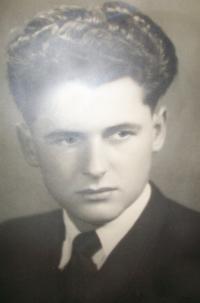The smile on my face has frozen for the rest of my life

Download image
Ľubomír Boďa was born on May 16, 1932 in the village of Medvecké, what was former named as Bimbula. Under the oppression of Hungarian government, after the Vienna Award in 1938, he and his parents had to leave their home. During the Second World War they lived in Slovakia, his father Ján joined the Slovak National Uprising in Turany. After the end of the war the family was able to return to their estate in Bimbula. Ľubomír studied at grammar school in Levice and was accepted to the Faculty of Education of the Comenius University in Bratislava. After receiving the call-up order, on November 1, 1952 he had to enlist in the Auxiliary Technical Battalions, where he stayed until November 1, 1954. The family land and property was confiscated by the totalitarian machinery and yet for the second time, they were evicted from their village. They moved to Zvolen. Ľubomír had problems to find a job and after some time he got employed at the state property in Diviaky, at the building construction department. Later he worked at District Construction Company in Zvolen, where he stayed until his retirement. He is married, has two children - son and daughter - and he lives in Zvolen.

